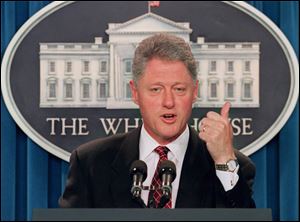
Many voters forgive and forget politicians with bad memories
9/5/2011
Former President Bill Clinton couldn't recall details in the Lewinsky case.
Politicians have a tendency to forget.
Several reminders of that have surfaced in recent weeks. In one case, a number of Lucas County politicians claimed they could not remember hearing about a Toledo City councilman soliciting a bribe prior to a zoning vote. In another case, a city councilman blamed faulty memory when confronted with evidence that contradicted her statements about a missed election-filing deadline.
Most people are generally sympathetic to such excuses, experts say. Who hasn't forgotten where they left the car keys? But when bouts of forgetfulness strike our politicians, especially in matters of ethical or legal significance, it often leaves voters -- and sometimes juries -- in murky water.
Take the revelation last week that former Toledo Councilman Louis Escobar testified that many of his colleagues knew about a $100,000 bribe former Councilman Bob McCloskey solicited as a condition of a 2002 rezoning vote.
Some of those colleagues denied Mr. Escobar's allegations, but others, including Pete Gerken, now president of the Lucas County Board of Commissioners, said they could not recall the talks with Mr. Escobar.
McCloskey pleaded no contest in 2006 in Lucas County Common Pleas Court to bribery for seeking the $100,000 for a proposed fund to pay for prescription drugs for retirees of Pilkington NA. Pilkington and a Michigan businessman, Erich J. Speckin, were seeking to rezone some Pilkington-owned property in East Toledo that Mr. Speckin planned to lease to a charter school.
What are constituents to make of such forgetfulness?
"When they tend not to recall things that affect their self-interest, that becomes suspicious," said Richard Waites, chief trial psychologist for The Advocates, one of the nation's largest trial consulting firms. He said juries use some basic guidelines in deciding whether to believe a witness who can't remember something: how much time has passed, is the subject matter important, and would a reasonable person remember the fact in question?
Politicians obviously have a self-interest in distancing themselves from the McCloskey scandal, though not as strong an interest as someone who is accused of taking a bribe. No other officials are. The amount of time that passed between the alleged conversations in 2002 and the depositions public officials gave in 2007 might lend credence to forgetfulness claims.
Still, Mr. Waites said, the narrative nature of such a scandal erodes their credibility. "There is a story there," he said. "A lot of psychological research shows people don't remember facts or details that happened a long time ago, but they do remember the stories."
Local politicians aren't the only ones plagued by poor recall. The faulty memory defense has been a hallmark of almost every major contemporary American political scandal, from the Iran-Contra affair to the Monica Lewinsky scandal. In the latter, President Bill Clinton made several statements in various venues that he could not recall certain details of meetings with Ms. Lewinsky and other people.
It's not new locally, either. Just last year, for example, Lucas County Sheriff James Telb was accused of covering up a death at the county jail. He was acquitted after he testified he couldn't recall if he had been informed about the inmate death at the hands of an officer.
While the "I can't recall" defense might work well in court, it's not necessarily a good political strategy, said Glenn Selig, a Tampa publicist and crisis manager whose clients have included former Illinois Gov. Rod Blagojevich and attorneys in the Casey Anthony case.
"I think most people think that politicians are dodging when they say, 'I don't recall,' " Mr. Selig said.
That could be a problem for Lindsay Webb, the Toledo councilman seeking re-election who filed her candidacy acceptance after a June 28 deadline. Originally, she told local media and the board of elections that she mailed the document from Ann Arbor the day it was due. The postmark, however, was dated six days after the deadline and contained a Toledo ZIP code.
"It doesn't make me a liar," she said when confronted with the postmark. "It makes me a bad recollector."
Although she's likely to stay on the ballot, she'll probably take some hits during the campaign.
Eric Dezenhall, a D.C.-based public relations consultant who specializes in damage control, said there's a reason scandalized politicians tend to claim poor memory.
"In a scandal, there is an innate tension between the legal process and public relations," he said. "The public relations discipline encourages speaking more forthrightly. The legal discipline says to keep your mouth shut. Generally, legal concerns trump public relations ones and political ones, which is why scandal figures tend to avoid making committal statements."
Ms. Webb chose not to refer to mailing the envelope on time from Ann Arbor in her filings with the Ohio 6th District Court of Appeals, which recently prevented a board of elections hearing that could have removed her from the ballot.
"A politician in the public, they're not swearing to it under oath," Mr. Waites said. "Unfortunately for the public, by the time the election comes around, it's sort of water under the bridge."
Which brings things full circle: "Voters have short memories," he said.
Contact Tony Cook at: tcook@theblade.com or 419-724-6065.